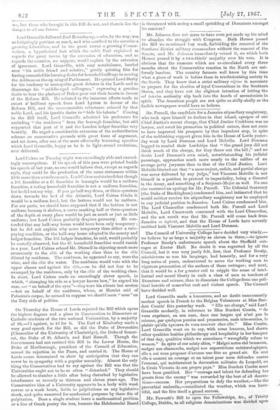Lord Granville followed Earl Beauchamp,—who, by the way, was as
fatiguingly partisan as usual, and who ascribed to the counties a growing Liberalism, and to the great towns a growing Conser- vatism, a hypothetical fact which the noble Earl explained as regards the great towns by the extension of education, and as regards the counties, we suppose, would explain by the extension of ignorance. Lord Granville, with easy nonchalance, bowled over "his noble friend and relative," gently quizzing him for baying concealed his burning desire for household suffrage in moving the Address on the opining of Parliament. He quizzed Lord Derby for his tendency to monopolize great debates in the Lords and to discourage his " middle-aged colleagues," expressing a genuine desire to hear the phalanx of Dukes pour out their hearts in favour of the Reform Bill. He referred to the immense efforts made to extort Fr brilliant speech from Lord Lytton in favour of the Reform Bill, and the unaccountable reluctance evinced by that






























 Previous page
Previous page